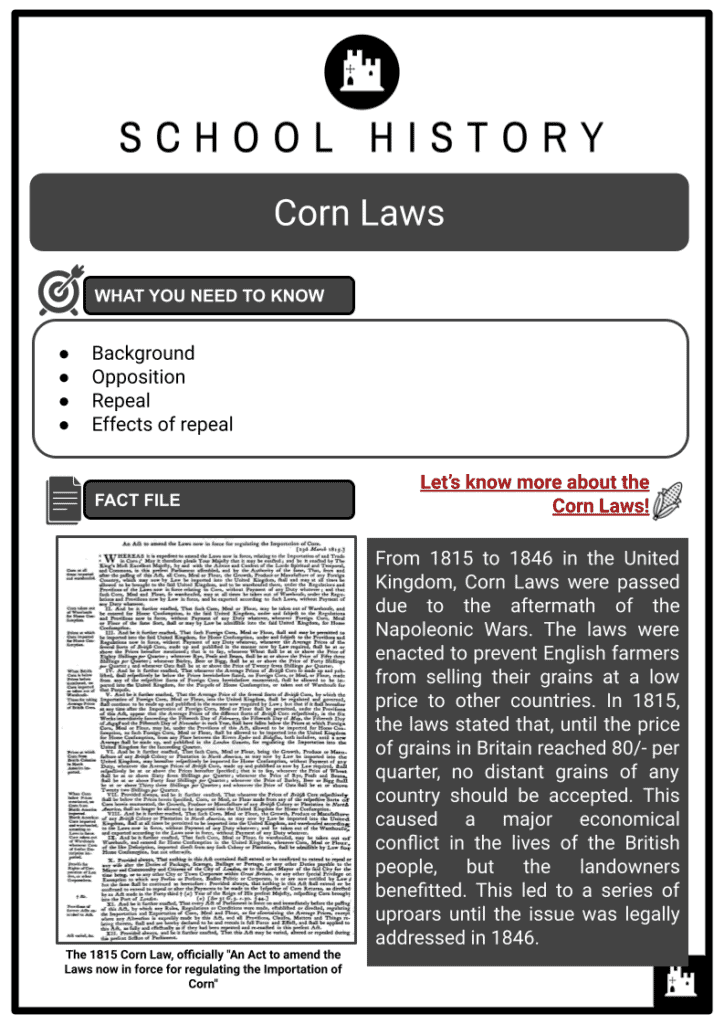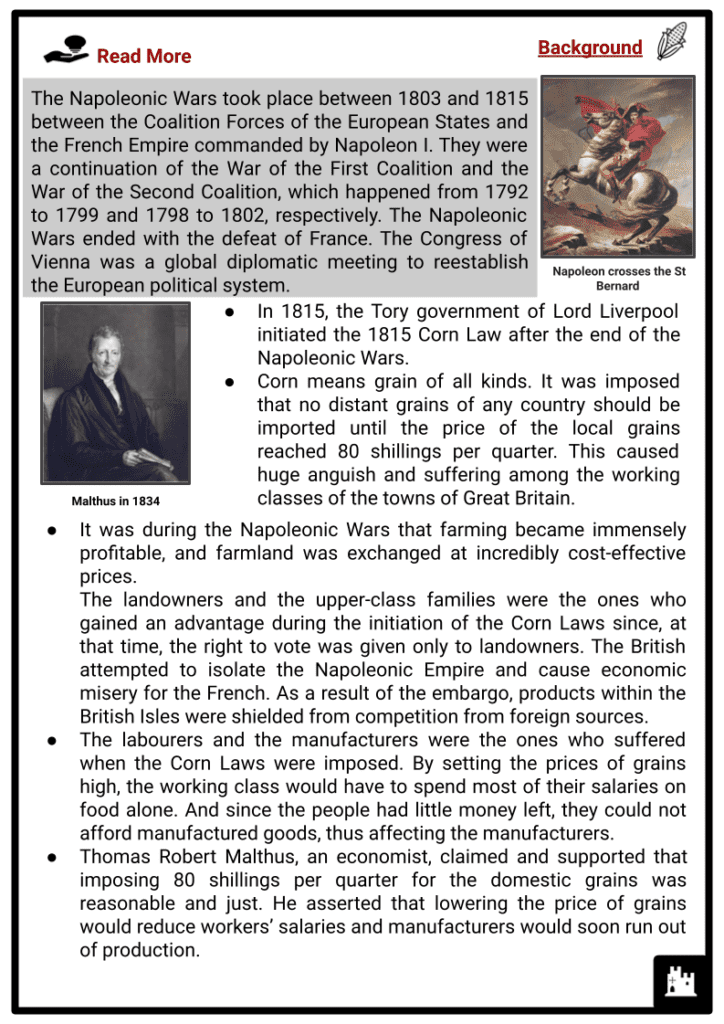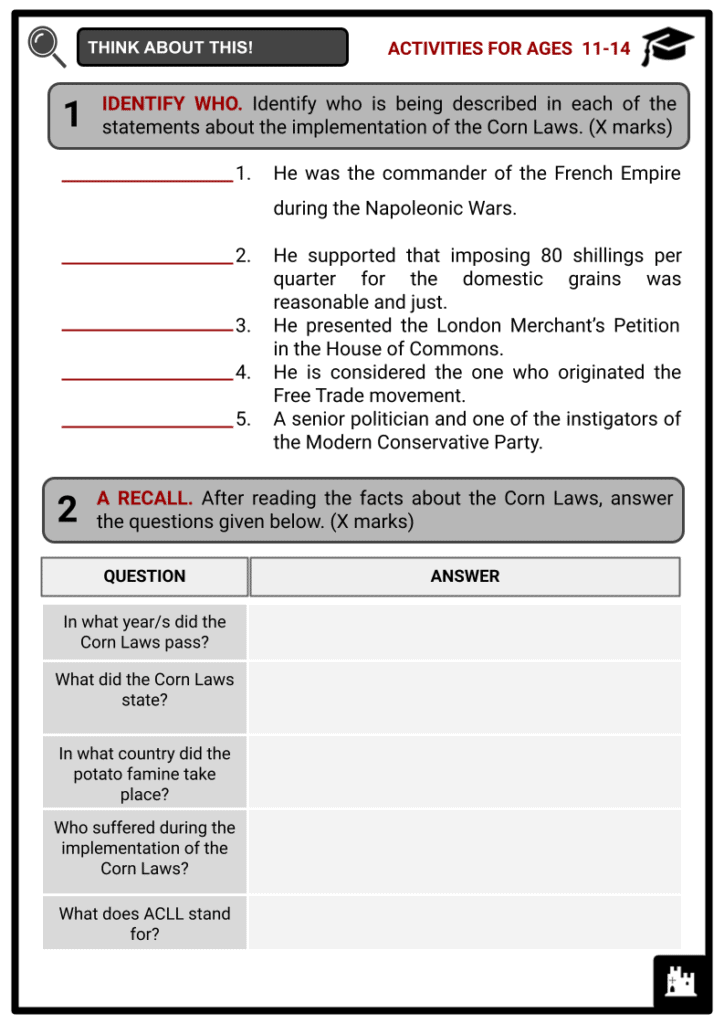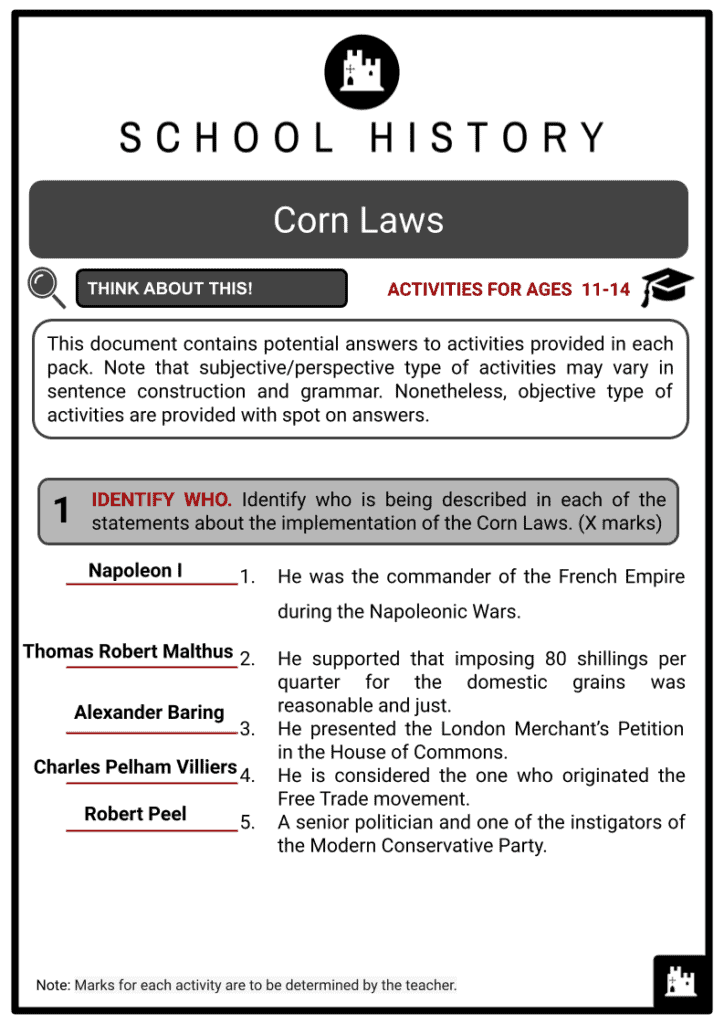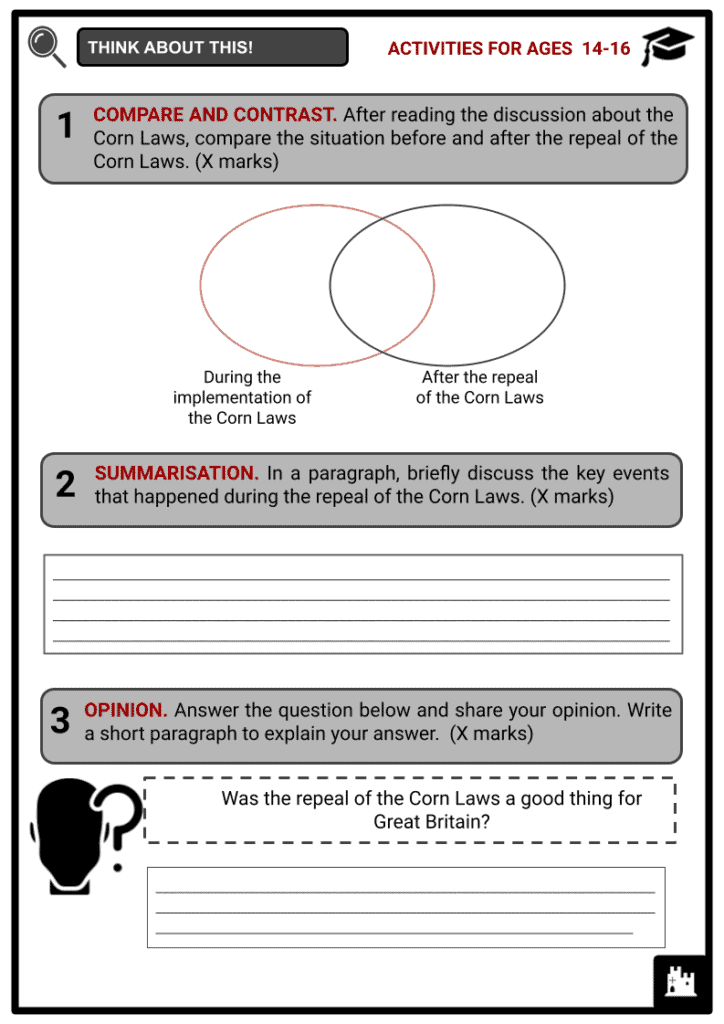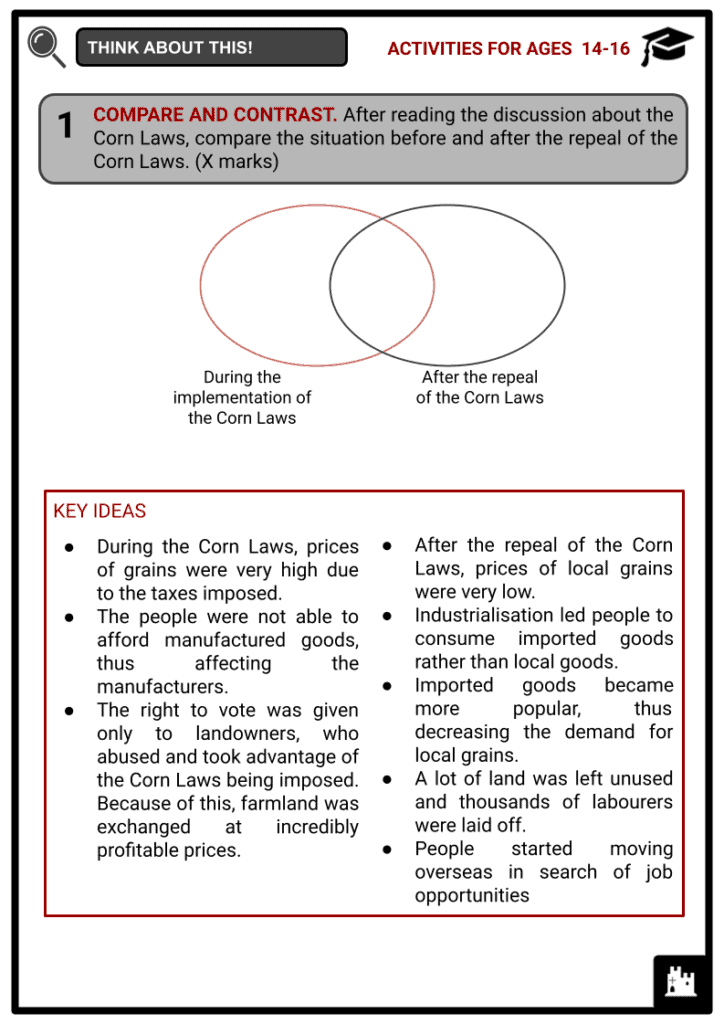Corn Laws Worksheets
Do you want to save dozens of hours in time? Get your evenings and weekends back? Be able to teach about the Corn Laws to your students?
Our worksheet bundle includes a fact file and printable worksheets and student activities. Perfect for both the classroom and homeschooling!
Summary
- Background
- Opposition
- Repeal
- Effects of repeal
Key Facts And Information
Let’s find out more about the Corn Laws!
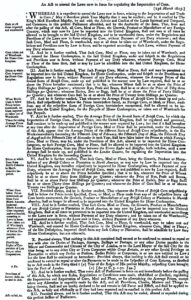
From 1815 to 1846 in the United Kingdom, Corn Laws were passed due to the aftermath of the Napoleonic Wars. The laws were enacted to prevent English farmers from selling their grains at a low price to other countries. In 1815, the laws stated that, until the price of grains in Britain reached 80/- per quarter, no distant grains of any country should be accepted. This caused a major economical conflict in the lives of the British people, but the landowners benefitted. This led to a series of uproars until the issue was legally addressed in 1846.
Background
- In 1815, the Tory government of Lord Liverpool initiated the 1815 Corn Law after the end of the Napoleonic Wars.
- Corn means grain of all kinds. It was imposed that no distant grains of any country should be imported until the price of the local grains reached 80 shillings per quarter. This caused huge anguish and suffering among the working classes of the towns of Great Britain.
Read More
The Napoleonic Wars took place between 1803 and 1815 between the Coalition Forces of the European States and the French Empire commanded by Napoleon I. They were a continuation of the War of the First Coalition and the War of the Second Coalition, which happened from 1792 to 1799 and 1798 to 1802, respectively. The Napoleonic Wars ended with the defeat of France. The Congress of Vienna was a global diplomatic meeting to reestablish the European political system.
- It was during the Napoleonic Wars that farming became immensely profitable, and farmland was exchanged at incredibly cost-effective prices.
- The landowners and the upper-class families were the ones who gained an advantage during the initiation of the Corn Laws since, at that time, the right to vote was given only to landowners. The British attempted to isolate the Napoleonic Empire and cause economic misery for the French. As a result of the embargo, products within the British Isles were shielded from competition from foreign sources.
- The labourers and the manufacturers were the ones who suffered when the Corn Laws were imposed. By setting the prices of grains high, the working class would have to spend most of their salaries on food alone. And since the people had little money left, they could not afford manufactured goods, thus affecting the manufacturers.
- Thomas Robert Malthus, an economist, claimed and supported that imposing 80 shillings per quarter for the domestic grains was reasonable and just. He asserted that lowering the price of grains would reduce workers’ salaries and manufacturers would soon run out of production.
Opposition
- It was during the year 1828 that the first crucial improvement of the Corn Laws took place at the Ministry of the Duke of Wellington. The price of grains was no longer imposed at 80 shillings per quarter and the importation of foreign grains was approved. The price of domestic grains fell to around 73 shillings per quarter.
- In 1820, Alexander Baring presented the London Merchant’s Petition in the House of Commons. It was written by Thomas Tooke, who was an economist and an English merchant. The petition supported free trade and ended the protective taxes imposed. Lord Liverpool, who was the prime minister who gave support to free trade, objected to the appeal.
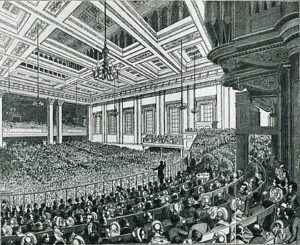
A meeting of the Anti-Corn Law League in Exeter Hall in London in 1846 - The Importation Act of 1822 states that distant countries’ grains could be bought if the price of domestic grains reached four pounds per quarter and would be stopped if domestic grain prices were 70 shillings per quarter. The price of domestic grains never reached 80 shillings per quarter. In 1828 the Duke of Wellington, who was the new prime minister at that time, and William Huskisson, a British statesman and the President of the Board of Trade, came up with the Importation of Corn Act 1828.
- Each year from 1837 to 1845, Liberal Whig MP Charles Pelham Villiers, considered the one who originated the Free Trade movement, submitted repeal resolutions in the House of Commons. The Whig administrations who ruled for the majority of the time between 1830 and 1841 opted not to remove the Corn Laws. In 1838, Charles Villiers talked at an assembly of the middle class or the labourers, which consisted of nearly 5,000 people. A bluebook or a buyer’s guide was issued by him and the Committee on Import Duties, which analysed the impact of the Corn Laws. Thousands of copies were distributed throughout England by the Anti-Corn Law League, a political movement in Great Britain whose objective was to suppress the Corn Laws.
Repeal
- In the 1841 United Kingdom general elections, Sir Robert Peel, a senior politician and one of the instigators of the modern Conservative Party was appointed as prime minister together with Sir Richard Cobden, one of the major campaigners for free trade and peace. Robert Peel is also known as the father of modern policing due to his founding of the Metropolitan Police Service.
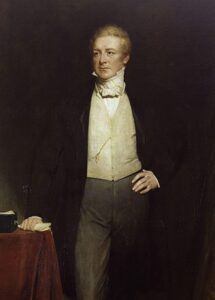
Robert Peel
Prelude to repeal
- In 1844, the Anti League, or the Central Agricultural Protection Society, was instigated by Charles Gordon-Lennox, the fifth Duke of Richmond, for a movement in support of the Corn Laws.
- In 1845 to 1849, the Irish potato famine took place, bringing scantiness and deprivation of food. The price of goods and commodities in Ireland was so high that only the rich could afford them. Despite the lack of food, Ireland continued to trade food to Great Britain. Because of this, Robert Peel urgently asked to revoke the taxes of grains by Order-in-Council until the legislative assemblies abrogated the existing Corn Laws.
- On 22 November 1845, the leader of Her Majesty’s Most Loyal Opposition, John Russell, stated in the form of an open letter in London to call for the government to address the issue of famine in Ireland and to show his utmost support for repealing the existing Corn Laws.
- On 4 December 1845, a statement was published in The Times, a British daily national newspaper, that the government wanted to summon the legislature to revoke the Corn Laws. Edward Stanley, three-time prime minister of England, stepped down from his duties as a cabinet member. Because of this, Peel also resigned as prime minister due to his frustration but returned to the position on 21 December 1846 after Whig leader Russell failed to gather men to establish a government as ordered by Queen Victoria. More than half of Peel’s party refused to accept his proposals and only the Whigs, a political party, supported his repeal.
- On 27 January 1846, a debate took place where Robert Peel made a three-hour speech. He stated that the Corn Laws should be eradicated on 1 February 1849.
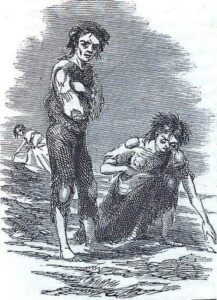
Potato Famine - The most assertive opposition to the repeal was the 1st Earl of Beaconsfield, Benjamin Disraeli, and Lord George Bentinck. They stated that granting the repeal would cause the nobles and landowners, who benefited most from the Corn Laws, to weaken, dismantling the territorial framework of Britain.
- On the third reading of the Importation Act of 1846, the majority of the Members of the Parliament sided to repeal the Corn Laws, outnumbering them by 95 votes. On 25 June 1846, the Duke of Wellington prevailed over the House of Peers, which is the upper house of the Parliament of England, to proceed in repealing the Corn Laws.
- On the same day, Robert Peel’s Irish Coercion Bill, which asked for increased state powers, prevailed by 73 votes by the Commons (292 vs 219). This forced him to leave his position as Prime Minister. He gave a resignation speech in which he praised Richard Cobden and ascribed the success of the repeal to him.
- As a result of Robert’s resignation, the Conservative Party split and the Whigs established a government with John Russell as its Prime Minister. The Peelites were formed from those who were devoted to Peel, which included George-Hamilton Gordon, Lord of Haddo, and William Ewart Gladstone, who served as the Prime Minister of England from 1868 to 1894.
- The Anti-Corn Law League did nothing in the admission of the repeal. The league influenced succeeding political groups while also establishing free trade as an emblem among the increasing British electorate. Many saw a vote against free trade as a vote for democracy.
Effects of Repeal
- In 1846, Parliament approved the repeal of the Corn Laws. The labourers and manufacturers who experienced hardship during these laws felt relieved. Twenty years after the repeal, the price of grains went to 52 shillings per quarter. However, agricultural machinery modernisations made an impact on British agriculture 25 years after the repeal.
- From 1877 to 1878, the price of local grains in Great Britain went down from 56 shillings to 46 shillings per quarter until the year 1886 when it reached a price of 31 shillings per quarter.
- The Corn Laws were ratified because the workers and the businesspeople were disconsolate about the prices of goods. However, after the Corn Laws were removed, the price of producing grains in Great Britain was much larger than importation.
- The increasing expansion of industrialisation emerged, which led to the development of economic shipment through railways and steamboats. Because of this, the earnings of the common people increased, leading to more consumption of imported goods.
- Imported goods became more popular, thus decreasing the demand for local grains. Because of this, a lot of land was left unused and thousands of labourers were laid off.
- People started moving overseas in search of job opportunities, which ruined the agriculture of Britain.
- Britain became dependent on the importation of goods, which backfired during the First and Second World Wars. Because of this, shipments became an enemy target as they tried to starve each other.
Image Sources
- https://upload.wikimedia.org/wikipedia/commons/thumb/9/9a/1815_Corn_Law%2C_An_Act_to_amend_the_Laws_now_in_force_for_regulating_the_Importation_of_Corn.jpg/800px-1815_Corn_Law%2C_An_Act_to_amend_the_Laws_now_in_force_for_regulating_the_Importation_of_Corn.jpg
- https://upload.wikimedia.org/wikipedia/commons/thumb/4/46/1846_-_Anti-Corn_Law_League_Meeting.jpg/420px-1846_-_Anti-Corn_Law_League_Meeting.jpg
- https://upload.wikimedia.org/wikipedia/commons/thumb/a/a1/Sir_Robert_Peel%2C_2nd_Bt_by_Henry_William_Pickersgill-detail.jpg/330px-Sir_Robert_Peel%2C_2nd_Bt_by_Henry_William_Pickersgill-detail.jpg
- https://upload.wikimedia.org/wikipedia/commons/thumb/9/97/Skibbereen_by_James_Mahony%2C_1847.JPG/360px-Skibbereen_by_James_Mahony%2C_1847.JPG

